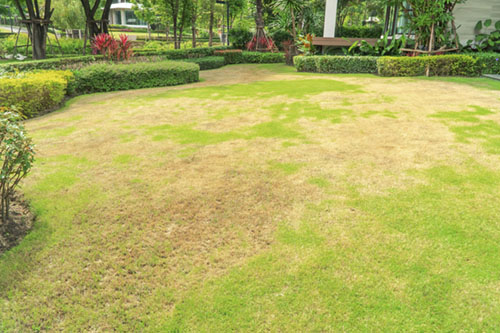
Taking Care of your Home and Lawn During a Drought
July 14 2022
DROUGHT-PROOF YOUR HOME’S FOUNDATION
This summer has been unbearably hot and dry. We can see our lawns under stress as they turn brown, but did you know that your foundation can crack from the drought? According to KHOU.com, the best way to protect our foundation is by watering it with a soaker hose.
Over time, our home's foundation starts to shift and crack due to the outside elements. As most homeowners know, this isn't good news because a broken wall may very well mean a broken wallet. One of the best pieces of equipment you can use to hydrate your home is a soaker hose. A soaker hose saves water by using less than half of what garden hoses use per hour by trickling water out slowly over time. Around the home, moisture evaporates quickly. The clay soil dries out and shrivels up. If you leave it like that, the home becomes unbalanced and eventually cracks leading to pricy repairs.
Be sure to water sparingly. Many of the area counties are under water conservation plans. Keep the ground moist, not muddy or soggy.
LAWN CARE DURING A DROUGHT
Drought is a significant period of extremely dry weather due to a lack of water in the local environment. Southeast Texas is experiencing a severe drought this year. Here are suggestions to care for your lawn during the drought.
1. Let the grass grow. Mow it 3” high or higher. Mulch your clippings—don’t bag them. Clippings enrich the soil to aid in drought resistance.
2. Avoid fertilizing. High-salt fertilizers can burn the turf, especially when applied during hot, dry periods. And a lawn needs plenty of water to allow the grass to absorb the fertilizer. Wait until fall when the temperatures cool to apply natural fertilizer.
3. Weed by hand. Weeds can suck the life out of your lawn, demanding all the water, nutrients, and space. When you see weeds growing, reach down and pull them out. Don’t apply herbicides to stressed grass. Doing so can cause more damage.
4. Don’t dethatch or aerate your lawn. Wait until spring or fall to do that when your lawn isn’t under stress.
5. Deeply water the grass between sunrise and 8 am. Try to water every 5-7 days or when you notice signs of wilting grass.
6. Keep off the lawn to keep the soil from compacting which can prevent water from soaking into the ground.
7. Maintain your equipment. Sharpen your mower blades at least twice a year.





